The Not-So-Secret Health Benefits of Shiitake (They’re Not Just for Salads & Stir-fry!)
In a hurry? Click here to read the Article Summary...
Did you know that shiitake mushroom is the second-most consumed type of mushroom across the globe after the common button mushroom? But are shiitake mushrooms good for you? And do they have any benefits beyond just being delicious in a salad or stir-fry? The answer is a resounding YES! And the good news is that it only takes a small quantity to make a remarkable difference to your health. Read on for shiitake mushroom nutrition facts and the amazing health benefits shiitake has to offer.
- What Are Shiitake Mushrooms
- Shiitake Are More Animal Than Plant!
- Shiitake Mushroom Nutrition Facts
- 4 Key Shiitake Health Benefits
- Important Shiitake Vitamins
- 8 Other Superstars of Shiitake Nutrition
- Shiitake Health Benefits for the Immune System & Cancer
- Adding Shiitake Mushroom to Your Health Regimen
What Are Shiitake Mushrooms?
Known as “shiitake” in Japan and “xianggu” in China, the scientific name for shiitake mushroom is Lentinula edodes. These fungi have been used for centuries in Asia as a medicinal food. There is evidence of shiitake mushrooms being cultivated as early as 1100 AD in China, where they were used to:
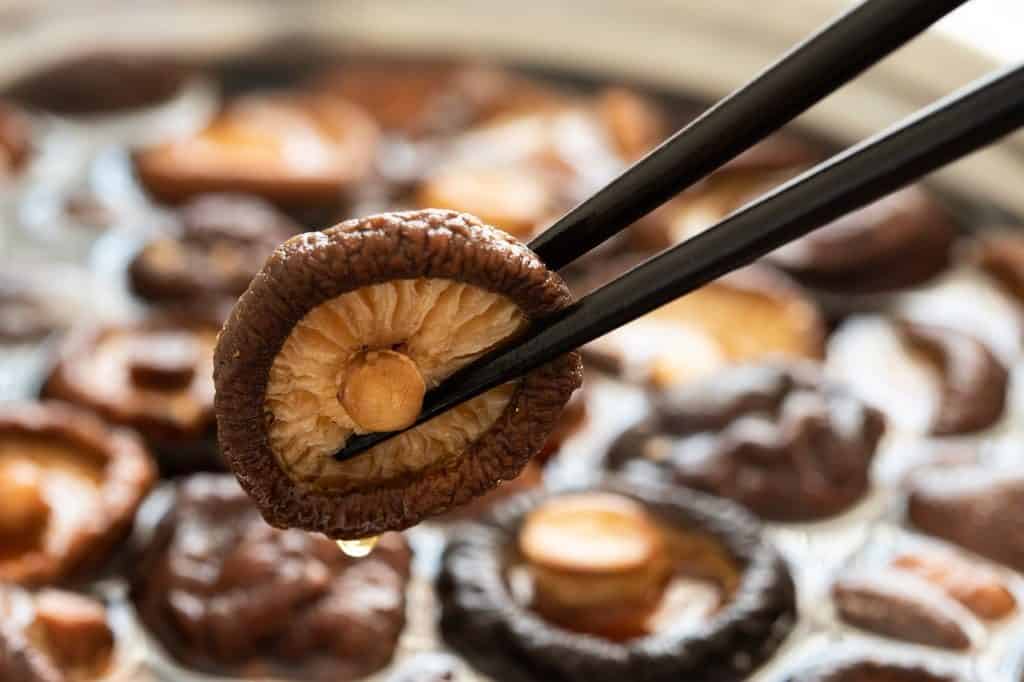
- ward off the common cold
- boost energy
- enhance wellness
The part of shiitake mushrooms that is consumed is called the fruiting body. It has a texture that can range from tender when raw, to a surprisingly meaty texture when cooked. Its umami flavor (especially when using dried mushrooms) makes it a culinary favorite. (Learn more about cooking with shiitake and other mushrooms here).
The main body of shiitake consists of thin white strands known as mycellia, and it is these strands that colonize tree stumps, dead and fallen trees, and other decaying organic matter. That’s where shiitake grow best, just like other prized medicinal mushrooms such as turkey tail mushrooms, maitake, and reishi mushrooms.
Shiitake Are More Animal Than Plant!
Most everyone thinks of mushrooms as a plant, but genetically shiitake mushrooms are actually considered to be closer to the animal kingdom than to the plant kingdom! Here’s why…
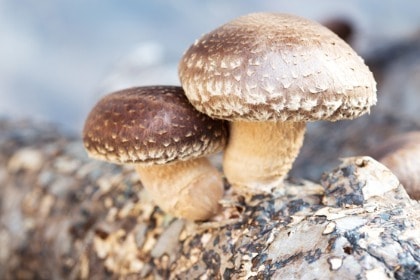
Like animals, shiitake have the ability to synthesize glycogen, a storable form of carbohydrate. This is part of what makes shiitake mushrooms so special – their many unique carbohydrate nutrients.
Because shiitake mushrooms like to grow on fallen trees, they also use enzymes that help to break down components of wood. These enzymes have also been found to provide health benefits to us humans.
Shiitake Mushroom Nutrition Facts
Shiitake nutrition is fairly well-studied, although science does seem to keep finding new shiitake mushroom benefits all the time. The USDA food database [1] shows that 100 grams of raw shiitake mushroom contain:
- 34 calories
- 2.24 grams of protein
- 0.49 grams of fat
- 2.5 grams of fiber
- 6.7 grams of carbohydrates
But just knowing the nutritional value of shiitake mushrooms doesn’t reveal the full extent of all the health benefits shiitake actually offers.
4 Key Shiitake Health Benefits
Shiitake have a wide range of health-promoting functions in the human body, including four very substantial benefits:
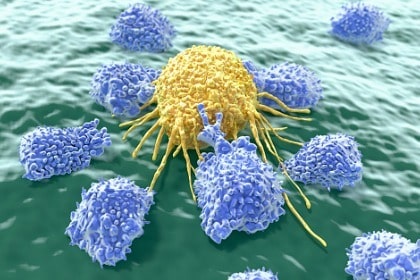
- Boosting immunity
- Acting against viruses
- Beating inflammation
- Helping to inhibit cancerous tumors
Shiitake are even “anti-fungal” which seems counterintuitive considering that they’re part of the kingdom of fungi [2]!
Let’s dive into some of the best, most therapeutic vitamins, minerals, and phytochemicals (natural, plant-based chemicals) found within shiitake that are responsible for these impressive health benefits.
Important Shiitake Mushroom Vitamins: D and B
Vitamin D
If shiitake mushrooms grow in the sun, they will be a good source of vitamin D and contain high concentrations of vitamin D precursors. Shiitake mushrooms also produce vitamin D3 and vitamin D4, which makes them a good vegan source of this vitamin [3].
Vitamin D has a huge range of biological actions in the body, including being required for:
- strong, healthy bones and teeth
- regulation of insulin levels
- immune system function

Your cardiovascular system, brain, and nervous system all need vitamin D. Vitamin D also influences the expression of genes involved in cancer development, so it’s considered an anti-cancer vitamin as well.
B Vitamins
Shiitake mushrooms are a very good source of B vitamins, which are required for many crucial functions in the body, including:
- supporting adrenal function
- the conversion of nutrients from food into energy
- DNA repair
- red blood cell production
- good brain health and nervous system function
- hormone balance and cell growth
Despite their importance for good health, many of us are deficient in one or more B vitamins.
8 Other Superstars of Shiitake Nutrition
#1. Eritadenine

Eritadenine is a unique alkaloid from shiitake which has been shown to inhibit the activity of an enzyme called angiotensin-converting enzyme (ACE) [4]. When ACE is active, it results in blood vessel constriction, which means that blood has less space in which to flow through the vessels. Inhibiting ACE helps to keep blood vessels a healthier, wider diameter, thus allowing a more normal range of blood pressure.
For years, doctors have prescribed synthetic drugs as ACE inhibitors. They are, however, notoriously toxic to the body, especially the kidneys [5]. They can also cause side effects and problems for the lungs, so natural ACE inhibitors like eritadenine in shiitake are especially valuable.
#2. Beta-Glucans
Beta-glucans are a special group of carbohydrate-related molecules known as polysaccharides (a long chain of linked sugars). Beta-glucans come with their own long list of important health benefits:
- Beta-glucans act as prebiotics which support the growth of beneficial gut bacteria. This, in turn, benefits the immune system as 70-80% of the human immune system is located in the gut [6].
- As beta glucans travel through the digestive tract, they inactivate the key enzyme of cholesterol metabolism, thus lowering cholesterol absorption [7,8]. They have also been found to reduce the incidence of atherosclerotic plaques in blood vessels [9].
- Beta-glucans act as antioxidants with strong free radical scavenging activity [10].
- Lentinan, a beta-glucan isolated from shiitake mushrooms, has been utilized for decades in Chinese and Japanese clinics for its anti-tumor properties and immune modulating benefits [11-14]. Lentinan was also found to be potentially useful in a 2019 study for managing inflammatory skin diseases or disorders caused by environmental pollutants [15].
Shiitake Mushroom for Weight Loss

Shiitake can even help with everyone’s favorite topic – weight loss. The simple sugars from shiitake are a soluble fiber. They slow down food transit time through the intestines and don’t cause a rise in blood sugar levels. Beta-glucans are known to help us lose weight. Being a soluble dietary fiber, beta-glucans help us to feel fuller for a longer period of time.
By eating shiitake mushrooms, you sort of trick your brain into believing you have eaten more than you actually have. Because you feel fuller, this can help with weight loss. In an animal study, it was shown that rats fed shiitake mushrooms along with a high fat diet over a period of six weeks did not gain weight. The rats who ate higher amounts of shiitake mushrooms were 35% slimmer than the other groups [16].
#3. LEFE
Isolated from shiitake mushrooms, LEFE (also known as “lentinus edodes fibrinolytic enzyme”) has been found to help control platelet aggregation in the bloodstream. When blood platelet cells clump together this can form a blood clot (thrombosis), which can create a myriad of serious health problems.
Researchers believe that LEFE may have applications for thrombosis-related cardiovascular disorders [17].
#4. Copper
Shiitake mushrooms are our fourth best food source of copper (coming after sesame seeds, cashews, and soybeans). An enzyme found in shiitake mushrooms known as laccase contains copper [18].
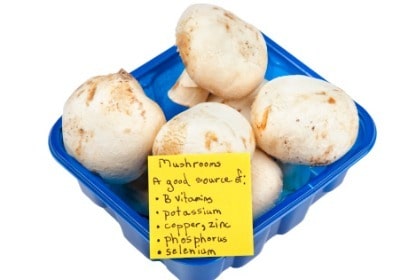
Just one-half cup of cooked shiitake mushrooms can provide you with 650 micrograms (mcg) of copper, which is about 72% of the recommended daily amount (RDA) of copper.
Copper is required by the body for forming red blood cells, together with iron. Copper is also required for good bone health, healthy blood vessels and nerves, and the immune system needs it in order to function properly [19].
#5. Zinc
Shiitake mushrooms contain zinc, an important antioxidant mineral. After iron, zinc is the most abundant trace mineral in the body and is required for many vital activities.
Over 300 enzymes require zinc for proper functioning in cellular metabolism, nerve cell activity, digestion, and many other processes. Zinc is also required by the body for:
- the immune system
- skin health
- DNA synthesis
- production of proteins
One single shiitake mushroom contains around one percent of the RDA for zinc.
#6. Selenium
Another important antioxidant mineral, shiitake mushrooms are a great vegan source of selenium. Required by the immune system and thyroid for proper function, selenium also helps to battle inflammation, is needed for skin health, and is required for glutathione peroxidase, a powerful antioxidant enzyme.

Many studies have found that selenium also has anti-cancer properties. In fact, selenium-containing compounds are being researched as alternatives in experimental chemotherapy in cases of multi-drug resistant breast cancer [20].
One cup of shiitake mushrooms provides about 51% of the RDA for selenium.
#7. Sulfur Compounds
Sulfur compounds from shiitake mushrooms have some important functions in the body and give shiitake mushrooms (especially the dried variety) their characteristic smell.
Lenthionine is one such sulfur compound, found to be [21,22]:
- antimicrobial
- cytotoxic (toxic to cancer cells)
- anti-inflammatory
- antioxidant
A 2004 study found that lenthionine also inhibited platelet aggregation (discussed above under Eritadenine) [23].
Another sulfur compound in shiitake is ergothioneine. It has been shown to have immune-boosting functions [24], as well as antioxidative and cell-protective properties [25].
#8. Lentiavidins
Lentiavidins are unique proteins from shiitake mushrooms, similar to egg white proteins. They bind with biotin, a B-complex vitamin. While research is ongoing and it’s not clear precisely what the health benefit is, lentiavidins are thought to be beneficial for helping the body to utilize biotin [26].
A Closer Look at Shiitake Health Benefits for the Immune System & Cancer
There are two potential health benefits of shiitake that deserve closer examination:
- the beneficial effect that they have on the human immune system, and
- their ability to help people with cancer.
Shiitake and the Immune System
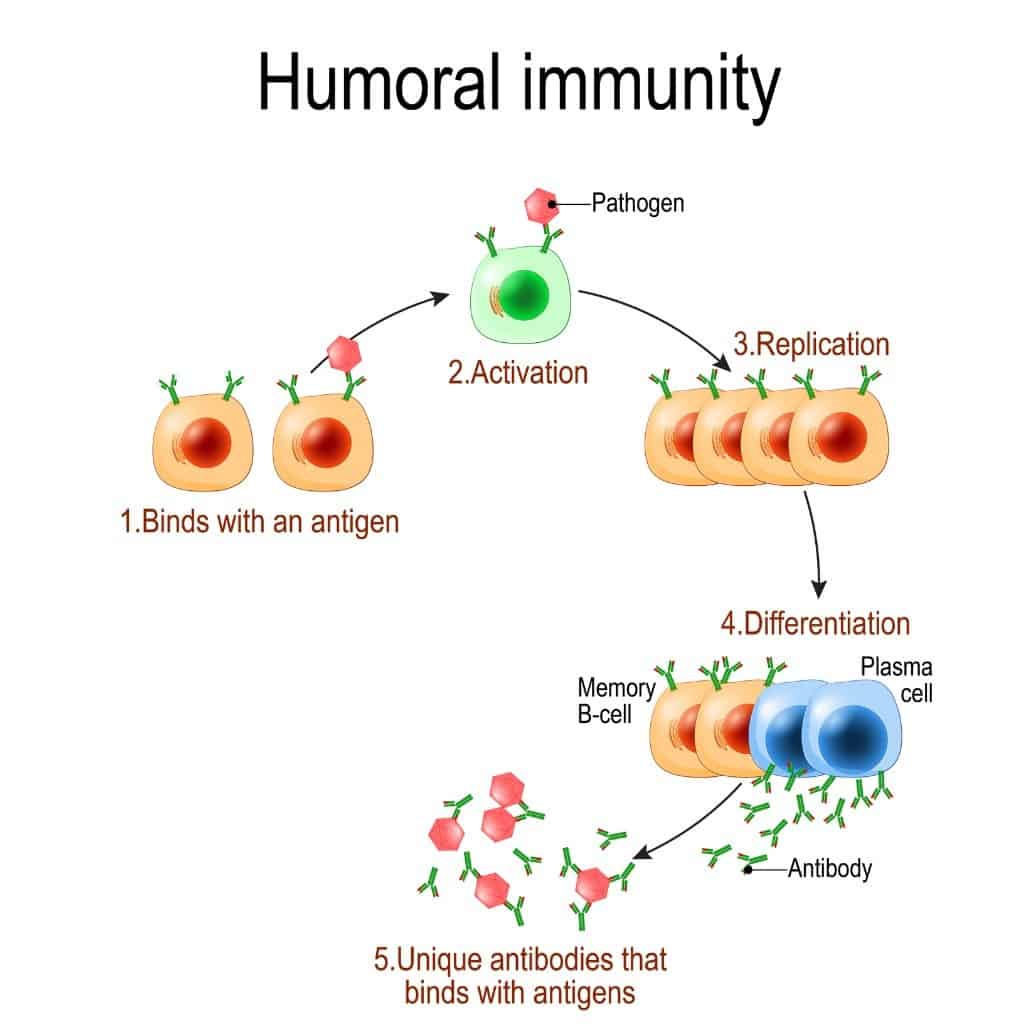
Without getting into a lot of technical jargon, there are two main sections of the human immune system. One is humoral immunity in which the immune system triggers specific B-cells to grow, go forth, and secrete large amounts of specific antibodies.
These antibodies are then used to combat a particular microorganism or a virus in order to stop an infection.
The other type of immunity is called cell-mediated immunity. This involves the activation of immune cells known as phagocytes and antigen-specific cytotoxic T-cells, and the release of various cytokines (chemical messengers) in response to the presence of toxins or other foreign substances.
A 2014 animal study found that shiitake (along with maitake mushroom) extracts “strongly stimulated” both branches of the immune system – cellular and humoral [27].
A 2013 animal study [28] investigated the role of shiitake mushroom extract on a cytokine known as interleukin-23 (IL-23).
IL-23 is produced by dendritic cells of the immune system. Dendritic cells act as messengers between the two arms of the immune system. They are responsible for collaring potentially harmful or allergenic substances and presenting them to T-cells which will render the substances harmless. The 2013 study showed that intake of shiitake mushroom extracts increased IL-23 levels, and enhanced gut immunity.
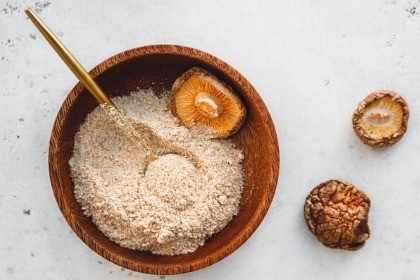
A small 2015 human clinical trial [29] investigating shiitake mushrooms found that a relatively small quantity of dried shiitake mushrooms made a big impact. In the study 52 healthy men and women took either five or ten grams of dried shiitake mushrooms daily for four weeks.
Researchers found that only five grams of dried shiitake (0.17 ounces) increased immunity and lowered inflammatory markers in the study participants.
Shiitake and Cancer
Due to their potent anti-inflammatory, anti-microbial, and immune-boosting properties (not to mention those beta-glucans), it shouldn’t come as a surprise that shiitake mushrooms have been found by researchers to display anti-cancer activity.
Dozens of studies have shown that shiitake may be beneficial for cancer patients in a variety of ways:
- In cell studies, shiitake inhibited the growth of breast cancer, myeloma, larynx carcinoma, lung cancer, gastric cancer, lymphoma, and osteosarcoma cells [30-32].
- They are cytotoxic (toxic to cancer cells) to non-small cell lung cancer, triple-negative breast cancer, cervical cancer, and prostate cancer in cell studies [33,34].

- They have chemopreventive (cancer-preventive) properties [35].
- Shiitake mushrooms contain a protein known as latcripin, which has been the subject of many studies which evidence its action against cancer cells, especially gastric cancer [36-39].
- A 2016 animal study [40] found that shiitake’s beta-glucans exerted “a profound inhibition ratio of ~75%” against murine (mouse-derived) sarcoma tumors, working even better than a commonly utilized chemotherapy drug, Cytoxan (also known as cyclophosphamide), which only inhibited the cells by around 54%.
This study also demonstrated that the beta-glucans from shiitake strongly promoted the accumulation of immune cells into tumors which resulted in apoptosis (programmed cell death) and inhibition of proliferation (rapid growth) and angiogenesis (the process by which tumors develop new blood vessels in order to feed themselves).
The beta-glucans also promoted tumor suppressor genes and down-regulated (inhibited) genes that promoted the growth of the tumors.
- A small 2016 clinical trial [41] investigated the use of shiitake mushrooms for 10 cancer patients receiving immunotherapy at a Japanese clinic. The patients’ quality of life symptom scores worsened during the first four weeks of treatment when they were receiving immunotherapy alone. However, when shiitake were introduced, their quality of life scores improved as did components of their immune system.
- Another small clinical trial was undertaken in 2017 with 47 breast cancer patients who were undergoing chemotherapy [42]. The women were divided into two groups. One group received chemotherapy treatment plus shiitake mycelia extracts, while the other group received a placebo. The women receiving the shiitake along with their chemotherapy fared better, with better quality of life and immune parameter scores.
- Lentinan (discussed above) was the subject of a 2018 review [43] which investigated 12 years’ worth of randomized controlled trials utilizing this shiitake beta-glucan for lung cancer patients.
Researchers found that for those using lentinan plus chemotherapy, there was a significant improvement in quality of life and the lentinan worked synergistically along with the chemotherapy to improve its cancer-killing power.
Adding Shiitake Mushroom to Your Health Regimen
As you can see, shiitake mushroom extracts are well-studied and have many potential benefits for health.
As a culinary ingredient, shiitake mushrooms (both fresh & dried) are excellent in a wide range of savory recipes including soups, stews, stir fry, casseroles, salads, and more.
3 Shiitake Mushroom Soup Recipes
Here are three different soup recipes you can try that feature shiitake mushrooms:
Buy Only Quality Shiitake Extracts & Mushrooms
Whenever you’re purchasing ingredients to enhance your health, look for the highest-quality products you can find from trusted suppliers. Ideally, your plant ingredients are organically grown to minimize exposure to harmful pesticides, insecticides, and fungicides.
Shiitake mushroom is one of just 7 organic medicinal mushrooms in Organixx 7 Mushrooms+.
7 Mushrooms from Organixx contains 7 of nature’s most powerful mushrooms for anti-aging, longevity, and immune support. Using centuries-old knowledge of the power of nutritional mushrooms and our breakthrough new formulation process we’ve unleashed the power of mushrooms in a way never before done.
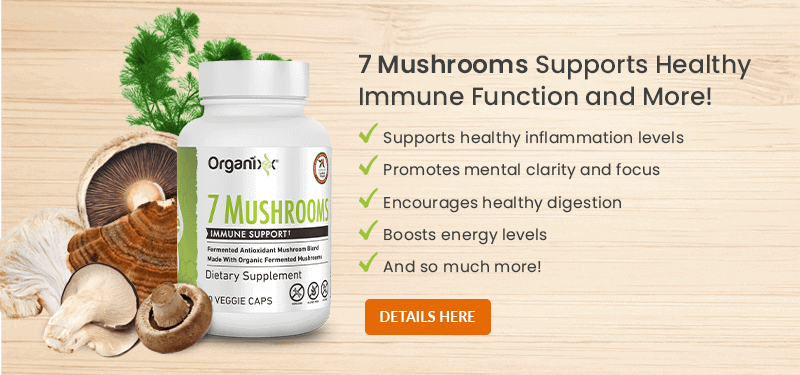
 Sources:
Sources:
Article Summary
Shiitake mushrooms are the second-most popular culinary mushroom in the world. They also have some incredible health benefits.
Shiitake have been used for centuries in Asia as a medicinal food and were used to:
- ward off the common cold
- boost energy
- enhance wellness
Modern research shows shiitake health benefits extend to 4 key areas:
- Boosting immunity
- Acting against viruses
- Beating inflammation
- Helping to inhibit cancerous tumors
Shiitake mushrooms are a good source of both vitamin D and B, which many people are deficient in. They’re also a good source of copper, zinc, and selenium along with other phytonutrients.
A 2015 human clinical study found that only five grams of dried shiitake (0.17 ounces) daily increased immunity and lowered inflammatory markers in the study participants.
Shiitake is one of 7 organic medicinal mushrooms in our anti-aging and immune-supportive Organixx 7 Mushrooms formula.


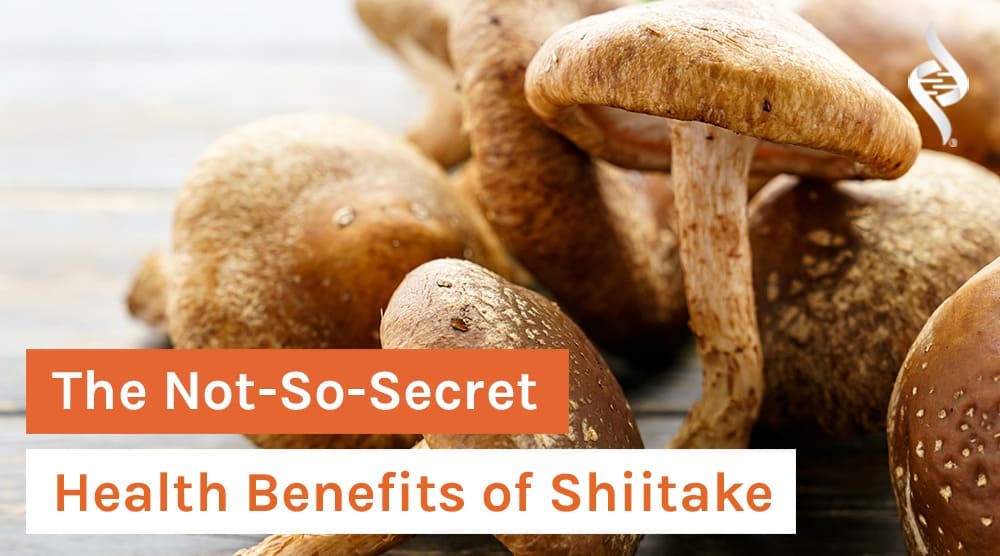
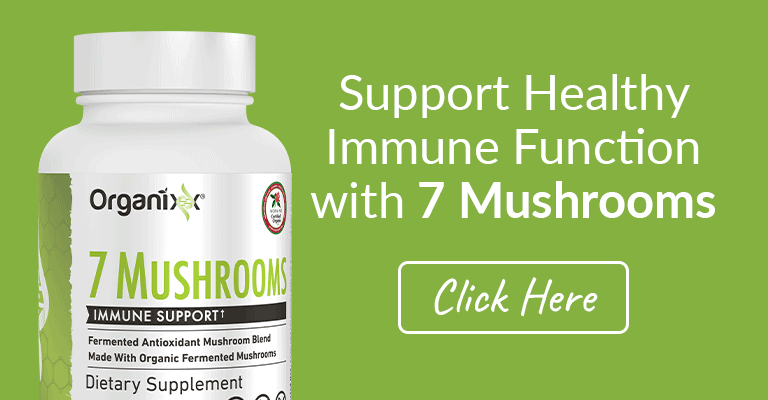

Since 2019-2020 I have taken a stronger interest in my Vitamin D, I am blaming my enlarged prostate on low Vitamin D, My doctor asked about 10 years ago after a blood test (before he gave me Vitamin D supplements to take one per week), Do you get much Sun strike?” I replied “Yes”, later on I was thinking I should not lie to my doctor, while it is true I am outside a lot and walking to work & home, all the sun sees is my face and hands.
During last 2020 Spring, my Vitamin D blood test was higher than the following middle of summer. I am beginning to think the Vitamin D came from cook mushrooms, not from ten minutes under the mid summer sun before putting on any skin protection. Just before the summer came I gave up cooking fresh mushrooms.
I never liked the rubbery feel to eating mushrooms until I cooked them myself, it appears some people drop the mushrooms into cold water, I boil a pot of water, after it boils I drop the broken mushrooms into the boiling water. And Bingo no rubbery feel to eating them.
As for the above question by Ilija “does cooking destroy vitamins”, a few years ago I started a lot of food that could be eaten cold is put in the same plate as cooked food, to get the best of both world of some vitamins get enhanced after food is cooked, while some is destroyed from cooking.
Hi Eric, Thank you for being here with us and sharing this information. I am sure your experience is going to be helpful to someone else reading this too. What a great way to prepare mushrooms. I never knew that boiling them will take away the rubbery texture. I can not wait to try this! We agree that some vitamins are enhanced during cooking while others are destroyed by heat. Wishing you the best in health! :)
Are the benefits when consuming the shiitake mushrooms reduced if the mushrooms are heated when cooked?
Hi Ilija, As we know heat can destroy some of the vitamins and minerals in food. However, research shows that when mushrooms (various types) are grilled or even microwaved, there is no significant loss in nutritional value. Please note that other ways of preparing can decrease the health benefits. For example frying. I hope you find this information helpful. Thank you for being here with us. Have an awesome day! :)